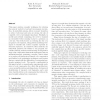Free Online Productivity Tools
i2Speak
i2Symbol
i2OCR
iTex2Img
iWeb2Print
iWeb2Shot
i2Type
iPdf2Split
iPdf2Merge
i2Bopomofo
i2Arabic
i2Style
i2Image
i2PDF
iLatex2Rtf
Sci2ools
179
click to vote
PLDI
1999
ACM
1999
ACM
Enhanced Code Compression for Embedded RISC Processors
This paper explores compiler techniques for reducing the memory needed to load and run program executables. In embedded systems, where economic incentives to reduce both ram and rom are strong, the size of compiled code is increasingly important. Similarly, in mobile and network computing, the need to transmit an executable before running it places a premium on code size. Our work focuses on reducing the size of a program’s code segment, using pattern-matching techniques to identify and coalesce together repeated instruction sequences. In contrast to other methods, our framework preserves the ability to run program executables directly, without an intervening decompression stage. Our compression framework is integrated into an industrial-strength optimizing compiler, which allows us to explore the interaction between code compression and classical code optimization techniques, and requires that we contend with the difficulties of compressing previously optimized code. The specific ...
Related Content
| Added | 03 Aug 2010 |
| Updated | 03 Aug 2010 |
| Type | Conference |
| Year | 1999 |
| Where | PLDI |
| Authors | Keith D. Cooper, Nathaniel McIntosh |
Comments (0)

